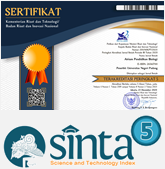The Effect of Problem Based Learning (PBL) Charged Science Literacy Toward Students’ Learning Competences at XI Grade of SMAN 1 Lubuk Alung
Abstract
This research based on the problem on SMAN 1 Lubuk Alung, those are inappropriate learning model choices and low of students’ learning competencies. An efforts could done to solve it was implementation of problem based learning model charged with science literacy toward the students’ learning competencies on the topic of excretion system at XI grade of SMAN 1 Lubuk Alung. This research aimed to know the effects of Problem Based Learning (PBL) charged with science literacy toward the students’ learning competencies at XI grade of SMAN 1 Lubuk Alung. The type of this research was experimental research and designed on Control Group Posttest Only. The populations of this research were all of the students at grade XI MIPA of SMAN 1 Lubuk Alung academic years 2017/2018 that consisted of seven classes. This research used purposive sampling technique to take the samples; those are XI MIPA 3 as experiment group and XI MIPA 2 as control group. The research’s instruments used were test for cognitive competence and observation sheets for affective and psychomotor competence. Hypothesis was tested by using T-test method.Based on the thesis result by using t-test, it can be concluded that on students’ cognitive competence tscore 4,15> table 1,67, on students’ affective competence tscore 5,07 > table 1,67, and on students’ psychomotor competence tscore 1,69 > table 1,67. It showed that hypothesis was accepted. So it can be concluded that the implementation of Problem Based Learning (PBL) charged science literacy model improved toward students’ learning competences at XI grade of SMAN 1 Lubuk Alung significantly with 0,05 degrees of truthiness.
Full Text:
FullpaperReferences
Friatma, Ayunda, Helendra, & Syamsurizal. (2017). Analisis Kualitas Soal Ujian Akhir Semester Genap Mata Pelajaran Biologi Kelas XI IPA SMA Negeri Wilayah Selatan Kabupaten Solok Tahun Pelajaran 2015/2016. Bioeducation Journal, 1(2), 50-67.
Hande, S., C. A. Mohammed danR. Komatil. 2015. “Acquisition of Knowledge Generic Skill and Attitude through Problem Based Learning: Student Perspective of a Hybrid Curriculum”. Journal of Taiba University Medical Science, 10 (1): 21-25.
Hayat, Bdan Suhendra. 2011. Mutu Pendidikan. Jakarta: Bumi Aksara.
Hosnan.2014. Pendekatan Saintifik dan Kontekstual dalam Pembelajaran Abad 21. Jakarta: Ghalia Indonesia.
Ivo, Novidsa, Darussyamsu, Rahmawati, & Syamsurizal. (2017). Peningkatan Kompetensi Sikap Peserta Didik Dengan Penerapan Strategi Learning Community Melalui Model Pembelajaran Inkuiri Pada Materi Struktur dan Fungsi Jaringan Tumbuhan Kelas VIII Di SMPN 12 Padang. Bioeducation Journal, 1(2), 87-96.
Kemendikbud. 2013. Model Pembelajaran Berbasis Masalah (Problem Based Learning). Jakarta: Badan Pengembangan Sumber Daya Manusia Pendidikan dan Kebudayaandan Penjamin Mutu Pendidikan.
Kunandar.2014. Penilaian Autentik (Penilaian Hasil Belajar Peserta Didik berdasarkan Kurikulum 2013) Edisi Revisi. Jakarta: Raja Grafindo Persada.
Lufri. 2010. Strategi dan Pembelajaran Biologi. Padang: Universitas Negeri Padang.
Lederman, N., S. Judth,and A. Allison.2013. “Nature of Science and Science Inquiry as Contexts for Learning of Scance and Achievenment of Scientifc Literacy”. International Journal of Education in Mathematics, Science and Tecnology, 1 (3).
OECD. 2012. PISA 2012 Result in Focus. Paris: OECD.
Oktaviani, L., N. Dantes dan W. Sadia. 2014. “Pengaruh Model Problem Based Learning Berbasis asesmen Kinerja terhadap Hasil Belajar IPA Ditinjau dari Gaya Kognitif”. E-journal Program Pascasarjana Universitas Pendidikan Ganesha. Vol. 4.
Permendikbud Nomor 103. 2014. Pembelajaran pada Pendidikan Dasar dan Pendidikan Menengah. Tentang Kurikulum.
Permendiknas Nomor 69. 2013. Kerangka Dasar dan Struktur Kurikulum Sekolah Menengah Atas/Madrasah Aliyah.Tentang kurikulum.
Sanjaya, W. 2008.Strategi Pembelajaran Berorientasi Standar Proses Pendidikan. Jakarta: Prenada Media.
Sudaryono.2012. Dasar-dasar Evaluasi Pembelajaran. Yogyakarta: Graha Ilmu.
Sudjana, N. 2012.Penilaian Hasil Proses Belajar Mengajar. Bandung: Remaja Rosdakarya.
Saifuddin, A. 2011. Sikap Manusia, Teori dan Pengukurannya. Yogyakarta: Pustaka Belajar.
Uno, H.B. danM. Mohammad. 2012. Belajar dengan Pendekatan Pailkem. Jakarta: Bumi Aksara.
Yamin, M. 2012. Desain Baru Pembelajaran Konstruktivis. Jakarta: Referensi.
Yuliati, Y. 2017. Literasi Sains dalam Pembelajaran IPA. Jurnal Cakrawala Pendas, 3 (2).
DOI: http://dx.doi.org/10.24036/apb.v3i1.4551
DOI (Fullpaper): http://dx.doi.org/10.24036/apb.v3i1.4551.g2717




